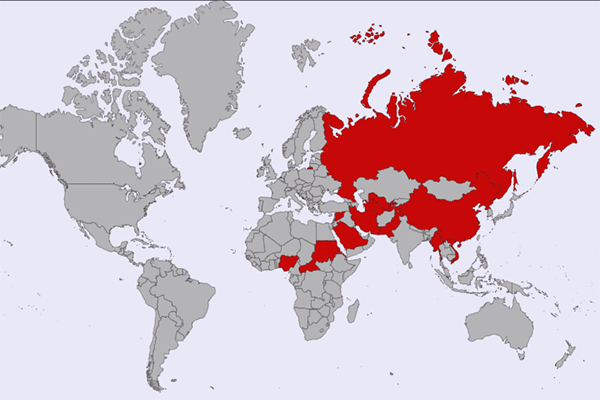The United States added a single country to its list of the world’s worst violators of religious freedom but designated for the first time nine non-state organizations for their violence against people of faith.
Secretary of State Mike Pompeo announced Dec. 11 he had added Pakistan to the list of “countries of particular concern” (CPCs), a category reserved under federal law for governments that have committed or tolerated “systematic, ongoing and egregious violations of religious freedom.”
‘Finally added’
While Pompeo did not comment on the addition of Pakistan, Sam Brownback, U.S. ambassador-at-large for international religious freedom, pointed to the country’s laws criminalizing blasphemy as one of the reasons for its inclusion on the CPC list. In a briefing with reporters Brownback also cited Pakistan’s failure “to hold accountable perpetrators of killings and violence against members of religious minorities targeted on account of their religious beliefs or affiliations.”
The U.S. Commission on International Religious Freedom (USCIRF) — a bipartisan, nine-member panel that researches and makes recommendations on religious liberty conditions overseas — commended Pompeo’s action on Pakistan, a Central Asian country that is 95 percent Muslim.
“We are gratified that, after years of reporting systematic, ongoing, egregious violations of religious freedom in Pakistan, the State Department has finally added that country to the list of the world’s worst violators,” USCIRF Chairman Tenzin Dorjee said in a written statement.
The CPC designations — actually made Nov. 28 by Pompeo — also included nine of the countries named in December 2017 by then-Secretary of State Rex Tillerson: Burma (Myanmar), China, Eritrea, Iran, North Korea, Sudan, Saudi Arabia, Tajikistan and Turkmenistan.
Pompeo removed Uzbekistan from the CPC list, placing it on a “special watch list” with Russia and Comoros, a group of islands off the east coast of Africa, for countries that have engaged in or permitted “severe violations” of religious liberty.
USCIRF urged in its April 2018 report the addition of not only Pakistan but Russia, Central African Republic, Nigeria, Syria and Vietnam to the CPC list. It also recommended Uzbekistan remain on the list.
Ethics & Religious Liberty Commission President Russell Moore commended the work that went into Uzbekistan being removed from the CPC list.
“When a country is placed on a list of ‘countries of particular concern,’ the hope is that these countries would reform and progress beyond that negative designation,” Moore said. “Unfortunately such rarely happens. Therefore we have cause for great celebration in Uzbekistan doing just that this year.
“There is no doubt that a significant reason for this is Ambassador Sam Brownback’s tireless and careful work toward broad reforms in that country,” he said. “My prayer is that his good work will continue to see such visible fruitfulness and that religious freedom would advance across the world.”
Entities of concern
Pompeo also named several “entities of particular concern” (EPCs), all of which are Islamic terrorist groups: al-Nusra Front in Syria; al-Qaeda in the Arabian Peninsula; al-Qaeda; al-Shabab in East Africa; Boko Haram in West Africa; the Houthis in Yemen; Islamic State of Iraq and Syria (ISIS); ISIS-Khorasan in Afghanistan and Pakistan; and the Taliban.
It was the inaugural use of the EPC classification established by Congress through the 2016 Frank R. Wolf International Religious Freedom Act.
In announcing the designations Pompeo said in a written statement, “In far too many places across the globe, individuals continue to face harassment, arrests or even death for simply living their lives in accordance with their beliefs. The United States will not stand by as spectators in the face of such oppression.”
Under federal law, the president has various means for penalizing countries put on the CPC list. In the latest designations, sanctions were placed on Burma, China, Eritrea, Iran, North Korea and Sudan, Brownback said. Sanctions were waived, however, for Pakistan, Saudi Arabia, Tajikistan and Turkmenistan, he said. (BP)






Share with others: